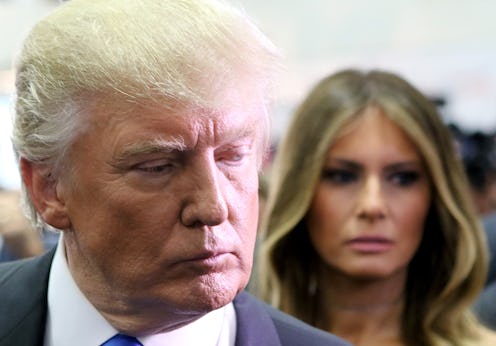News
Trump, Locker Room Banter, And Excusing Sexism
The Donald Trump campaign was hit with yet another significant scandal on Friday, as Washington Post reporter David Fahrenthold unearthed 2005 audio of Trump making several extremely misogynistic comments about women. In the remarks, Trump bragged that he can “just start kissing” women without asking their permission, because he’s “a star,” and added that he can also “grab them by the p---y” if he so desires. When the story was published, Trump claimed it was just “locker room banter,” as if that makes it OK. It doesn't — and the phrase "locker room banter" is almost as much of a problem as Trump's initial remarks.
The fact that Trump said hideously sexist things is not, in and of itself, news. He’s said plenty of sexist things over the course of his career; if you’d like a refresher, here are a few examples. But his response to the scandal, while uniformly terrible, is nevertheless instructive in understanding one big way in which society excuses misogyny and, as a result, empowers misogynistic attitudes.
“This was locker room banter, a private conversation that took place many years ago,” Trump said in a statement after the 2005 audio was published. “Bill Clinton has said far worse to me on the golf course - not even close. I apologize if anyone was offended.”
Let’s set aside the knock at Bill and focus on the first part, the part about “locker room banter.” That depiction isn’t literally true in that Trump wasn’t in a locker room when he said these things, but the intended point is obvious. Trump is arguing that men talk like this to each other all the time, and so it’s not worth getting upset about, because, hey, that’s just how guys are!
In other words, boys will be boys. This is an age-old excuse for awful behavior, and it’s been used throughout history to bolster two dangerous and incorrect assumptions about misogyny: that it’s irreversibly hardwired into men at a biological level, and that this makes it permissible.
Neither of those assumptions are true. It’s true that men, for a variety of reasons, often develop latent sexist beliefs at a young age, and that undoing this conditioning takes effort. Plenty of men don’t do the hard work of examining and questioning their own sexist attitudes — but it’s certainly within every man’s capacity to do this. And while most men do have a degree of latent sexism, Trump was engaging in an especially odious type of sexism. He was bragging about being able to touch women without their permission, a behavior widely known as sexual assault. Even in male-dominated environments where a degree of misogyny goes unquestioned, that kind of language is most certainly not inevitable.
More importantly, misogyny — and in Trump's case, implying that it's cool to touch women against their will with impunity — isn’t OK, regardless of how prevalent it is. Sexist language may well be common in locker rooms, but that doesn’t make it permissible. Why would it? There are plenty of things that are bad despite the fact that they occur. Lying is common in political campaigns, corruption is common in government, and war is common in human societies; are lying, corruption and war OK? Does the fact that something happens a lot make it morally acceptable? Of course not.
And yet phrases like “locker room banter” and “boys will be boys” imply the opposite. They allow us — by which I primarily mean men — to casually wave away sexism and minimize its damaging effects under the false assumptions that misogyny is both inevitable and, therefore, not a problem. But misogyny isn't inevitable, and even if it were, it would still be a problem.
It's time to retire this turn of phrase, and refer to comments like Trump's as what they are: dehumanization. Trump is dehumanizing an entire gender and reducing women's value to their physical appearance, and when we write this off as "locker room banter," we're implicitly condoning it. Let's stop condoning it.
